Pressure’s on for Donald Trump to make diplomats safer
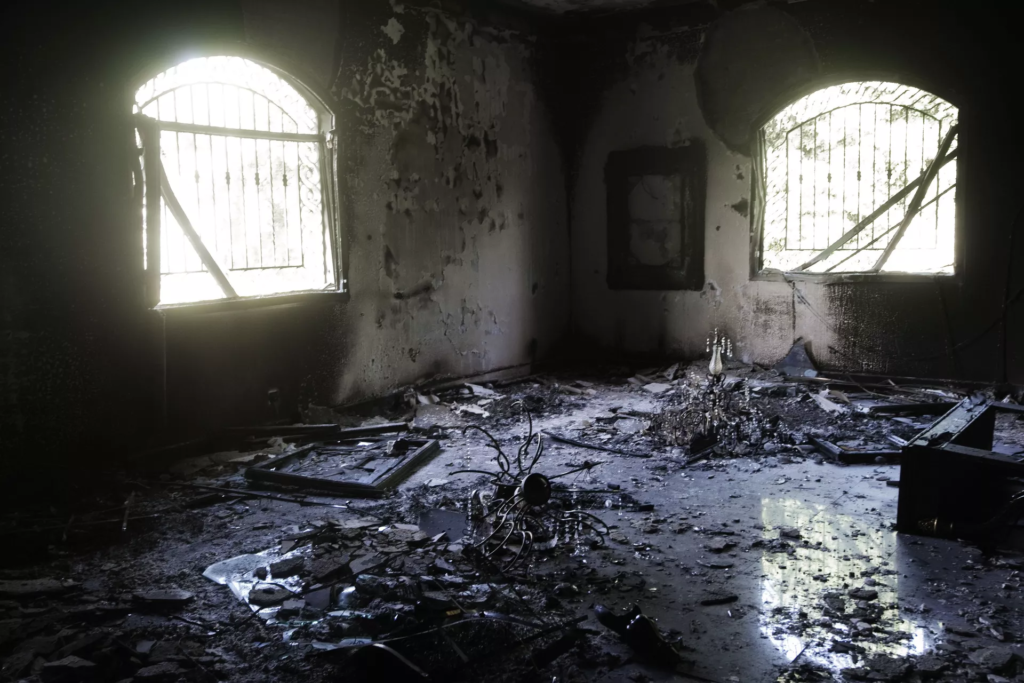
Donald Trump hammered rival Hillary Clinton during the presidential campaign for failing to prevent the attack on the U.S. mission in Benghazi, Libya, when she was secretary of state. Soon he’ll be the one responsible for protecting America’s diplomats, but he’s offered little insight into how he’ll do that. After the 2012 Benghazi attack, Congress boosted spending on security to protect the tens of thousands of Americans and foreign staff that make up the U.S. diplomatic service. Security experts and career diplomats say there have been improvements, but that significant shortfalls remain. Last week’s assassination of Russia’s ambassador to Turkey, Andrei Karlov, was a chilling reminder that diplomats are increasingly exposed to threats, even in countries that are typically not regarded as hardship posts. The assassin shouted, “Don’t forget Aleppo,” apparently referring to Russia’s military engagement in Syria. It’s not clear whether having a brashly outspoken figure like Trump in the White House will compound diplomatic security challenges. The foreign policy of Trump and his pick for secretary of state, Rex Tillerson, remains somewhat of an enigma. The Trump transition team didn’t respond to questions about how his administration will address diplomatic security. Keeping diplomats safe is a costly business. In the last budget year, Congress approved $3.39 billion for the Diplomatic Security Bureau’s functions around the world. That accounts for about 7 percent of the State Department’s overall budget. Diplomatic security has also become highly contentious since the killings of Ambassador Christopher Stevens and three other Americans at Benghazi. The Republican-led House Select Committee on Benghazi concluded in June that there were lethal mistakes by the Obama administration, though it found no “smoking gun” pointing to wrongdoing by Clinton. The committee included Rep. Mike Pompeo, R-Kan., Trump’s pick to head the CIA. Another member of the committee, Rep. Jim Jordan, R-Ohio, criticized the Obama administration for refusing to create the position of undersecretary for diplomatic security. He called it the most important change “to enhance diplomatic security.” He claimed committee Democrats “stonewalled and played games while we searched for the truth.” The top Democrat on the House Intelligence Committee, Rep. Adam Schiff of California, accused Republicans of losing interest in diplomatic security now that the election is over. “Since the issue is no longer a useful cudgel against Secretary Clinton, I fear the (Republican) majority’s commitment to diplomatic security will once again fade, and the State Department could face cuts both to security budgets and to core diplomatic functions,” Schiff said. A 2012 government inquiry following the Benghazi attacks made more than two dozen recommendations for security improvements, highlighting serious lapses in management and leadership that left the consulate vulnerable. The Bureau of Diplomatic Security declined to answer specific questions on the areas where improvement is still needed, but said diplomatic security “constantly balances available resources to provide a safe and secure environment for the conduct of U.S. diplomacy.” Security experts and diplomats say more can be done within individual diplomatic missions to improve safety. Mission security chiefs can use more training, and ambassadors and other mission leaders should also be given greater authority over security matters since they are most familiar with conditions on the ground, experts say. Fred Burton, a former diplomatic security agent and vice president for intelligence at intelligence firm Stratfor, said mission security officials “never had that ability to speak for ourselves at these kinds of decision-making meetings because you’re pushed down on this flow chart and then you’re left … with all the challenges of being in a place like Benghazi.” Burton, author of “Under Fire: The Untold Story of the Attack in Benghazi,” said he’s not optimistic the problem can be fixed unless Tillerson is confirmed “and his desire is to restructure the bureaucracy inside State.” Traditionally, host countries have been obligated by treaty to protect diplomatic facilities. But with non-state actors gaining ground and capable of destabilizing governments, it’s falling to the U.S. to take all precautions to protect its diplomats while still giving them the freedom to do their jobs. Robert Ford, a former ambassador to Syria, said the most helpful way Congress and the administration could advance diplomatic security is by providing “strong support for locally determined security resource needs.” “Security issues cannot realistically be micro-managed from Washington-based officials because only the people on the ground have an up-to-date sense of conditions and the evolution of threats,” he said. Republished with permission of the Associated Press.
‘Stop whining,’ Barack Obama tells Donald Trump
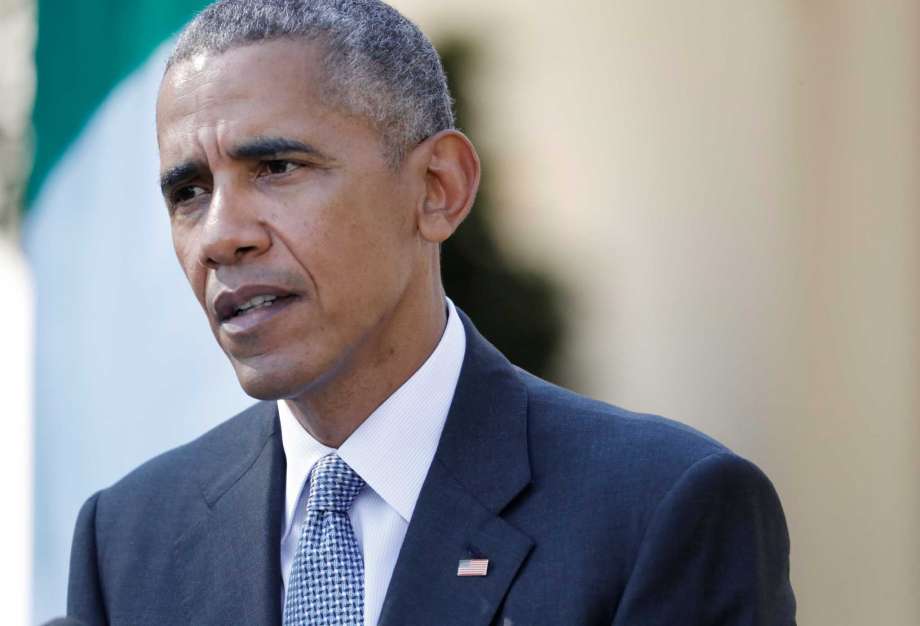
President Barack Obama on Tuesday tore into Donald Trump for sowing suspicion about the integrity of the U.S. election, telling the Republican presidential nominee to “stop whining” and focus on winning votes. Obama called Trump’s intensifying, pre-emptive warnings about voter fraud “unprecedented” in modern politics. The rhetoric is not based on any evidence, Obama said, but is simply aimed at discrediting the election before the first votes are counted. “You start whining before the game’s even over?” Obama said at a press conference. “Then you don’t have what it takes to be in this job.” Obama delivered his biting rebuke at White House, where he hosted Italy’s Prime Minister Matteo Renzi for a state visit. The president initially said he would pull his punches when it comes to politics, respecting the official setting. But when he was asked about Trump’s rhetoric, he did not hold back. The president also accused Trump of showering praise and modeling his policies on Russian President Vladimir Putin to a degree that is “unprecedented in American politics.” He said is “surprised and troubled” by Republican lawmakers who he said are echoing their presidential nominee’s positions on Russia. Trump has praised Putin as a strong leader and criticized Obama and the Democratic presidential nominee, Hillary Clinton, for Washington’s deteriorating relationship with Moscow. In an interview Monday, Trump said Russia “can’t stand” either Democrat. Trump promised a closer relationship with Putin, if elected, starting with a possible meeting with Putin before the U.S. inauguration. The president’s remarks come as Trump and his Republican allies are looking for ways to swing momentum their way after a damaging few weeks in the campaign. Earlier Tuesday, Republicans seized the latest developments in the Clinton email controversy as an issue that could help Trump make up ground in the final presidential debate Wednesday night. That followed news that the State Department had asked FBI officials to lower the classification of a sensitive email related to the attack on the U.S. compound in Benghazi, Libya. FBI notes released Monday revealed discussion of a “quid pro quo” in trying to get the email reclassified, though it’s not clear who first raised the issue and both State and FBI officials deny any bargaining took place. Obama said Tuesday the version Trump and other Republicans are talking about is “just not true.” Trump called it “one of the great miscarriages of justice” in history. As the final debate has approached, the GOP candidate has continued his warnings that the election is “rigged,” angering not only Democrats but fellow Republicans who worry his claims will hurt public faith in all elections. And as news about the emails hit, Melania Trump made her first public comments about the allegations of sexual assault and misconduct lodged against her husband. In an interview with Fox News aired Tuesday, Mrs. Trump said she believes the accusations were coordinated by political rivals: “They want to damage the presidency of my husband, and it was all planned, it was all organized from the opposition.” Her comments carried echoes of Clinton’s allegations of a “vast right-wing conspiracy” organized to raise similar allegations against her husband two decades ago. Trump notably tried to revive Bill Clinton’s history by inviting his accusers to the last debate. His guest list for Wednesday’s faceoff in Las Vegas signaled he hoped to change the subject. The Trump campaign said Tuesday that Pat Smith, whose son, Sean Smith, was killed in the attack in Benghazi, will be attending the debate in Las Vegas as the candidate’s guest. Smith was a featured speaker at the Republican National Convention, where she delivered an emotional speech blaming Clinton for her son’s death and accusing her of lying to families about what sparked it. Clinton planned to spend Tuesday in New York preparing for the debate in Las Vegas. Trump was slated to hold rallies in Colorado. The disclosure of FBI documents revives questions about Clinton’s use of personal email during her time as secretary of state. The issue that has dogged her campaign and damaged voters’ trust in her even as she remains the favorite ahead of the Nov. 8 vote. The declassification of the Benghazi email never took place. Meanwhile, Clinton is trying to expand her edge over Trump — even in Republican territory. Her campaign announced Monday it was launching a new push in Arizona, including a campaign stop in Phoenix by first lady Michelle Obama, one of Clinton’s most effective surrogates. Republished with permission of the Associated Press.
Twitter: 17 million-plus tweets sent about the debate, most ever
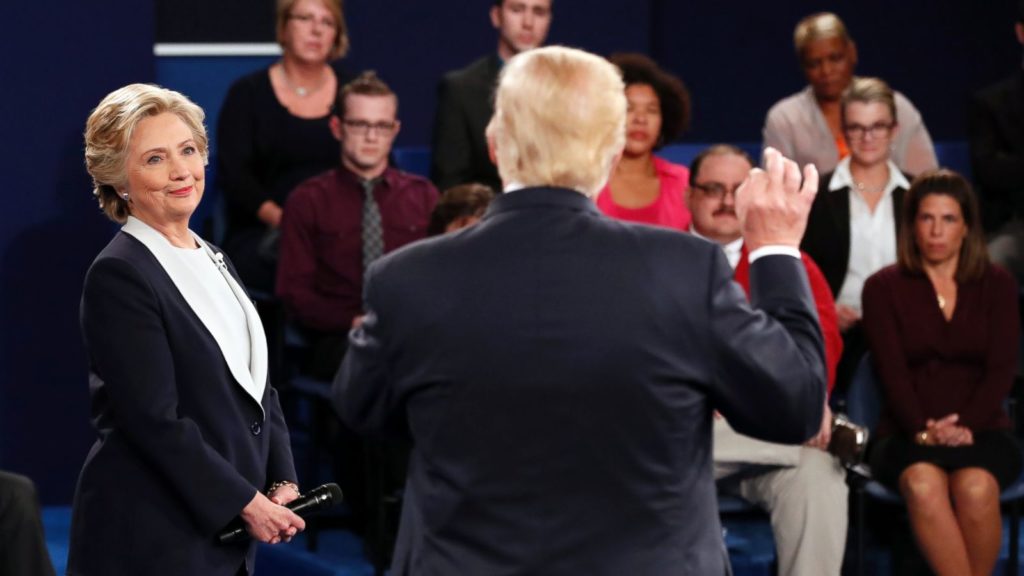
Twitter says Sunday’s presidential debate was the most tweeted ever, with more than 17 million tweets related to the forum sent. The social media platform says the question of Republican nominee Donald Trump‘s treatment of women dominated the online conversation. Trump’s disagreement with running mate Mike Pence over Syria was the top tweeted moment. That’s followed by Trump saying he was a gentleman and his threatening to jail Democratic nominee Hillary Clinton if he’s elected president. Clinton walked away from the debate with 25,000 new Twitter followers. Trump gained 16,000. As has become the norm, the debate has spawned some trending hashtags. Trump’s answers to questions are being mocked under #MuslimsReportStuff and #LockerRoomTalkIn5Words. Google says the top fact-check question for Clinton revolves around Benghazi. For Trump, users want to know more about his comments on women. Republished with permission of the Associated Press.
Benghazi emails involving Hillary Clinton recovered by FBI, State Department says
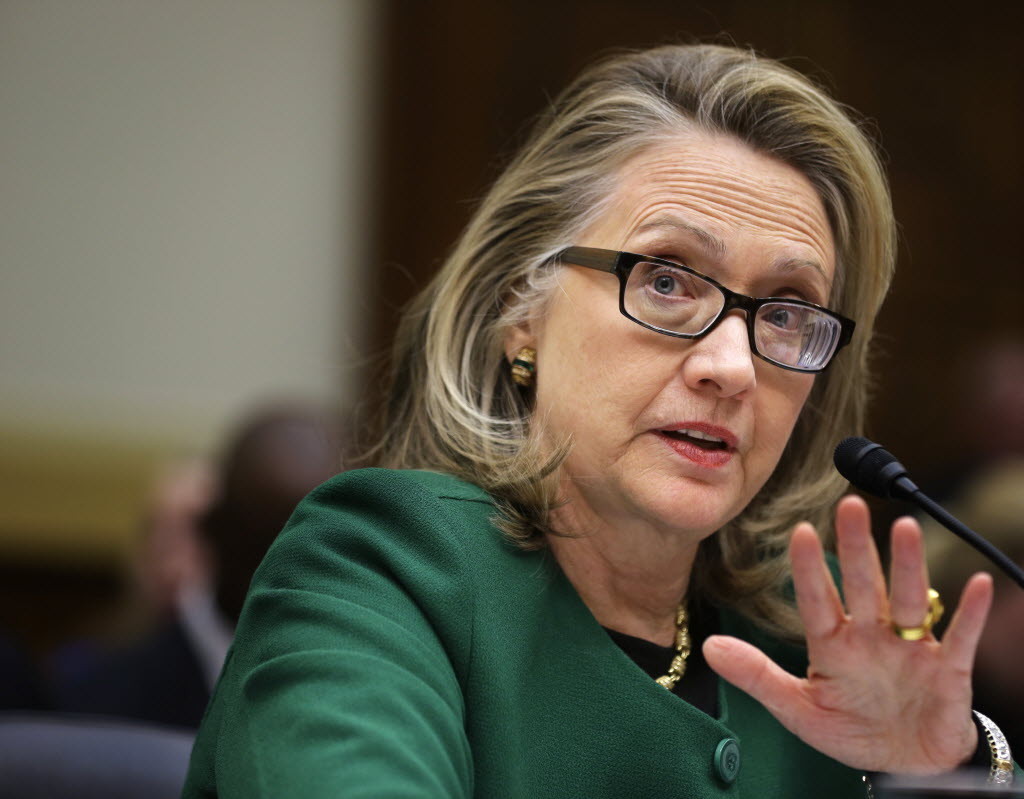
The State Department says about 30 emails involving the 2012 attack on U.S. compounds in Benghazi, Libya, are among the thousands of Hillary Clinton emails recovered during the FBI’s recently closed investigation into her use of a private server. Government lawyers told U.S. District Court Judge Amit P. Mehta Tuesday that an undetermined number of the emails among the 30 were not included in the 55,000 pages previously provided by Clinton to the State Department. The agency said it would need until the end of September to review the emails and redact potentially classified information before they are released. The hearing was held in one of several lawsuits filed by the conservative legal group Judicial Watch, which has sued over access to government records involving the Democratic presidential nominee. The State Department has said the FBI provided it with about 14,900 emails purported not to have been among those previously released. Clinton previously had said she withheld and deleted only personal emails not related to her duties as secretary of state. In a separate development Tuesday, a law enforcement official told The Associated Press that the FBI is expected to release documents soon related to its investigation, which focused on whether Clinton and her aides mishandled government secrets. The official, who was not authorized to discuss the matter by name and spoke on condition of anonymity, said documents in the case would be made public as the FBI responds to Freedom of Information Act requests. It wasn’t immediately clear when the documents would be released or exactly what they would include. Though he described Clinton’s actions as “extremely careless,” FBI Director James Comey said his agents found no evidence that anyone intended to break the law and said “no reasonable prosecutor” would have brought a criminal case. The FBI this month provided Congress portions of its file from the agency’s yearlong investigation. The FBI interviewed Clinton for several hours at FBI headquarters in Washington just days before announcing its decision to close the investigation. The Justice Department accepted the FBI’s recommendation. CNN reported that the records could be made public as early as Wednesday. Republished with permission of The Associated Press.
Hillary Clinton camp pushes back as GOP challenges FBI, seeks probe
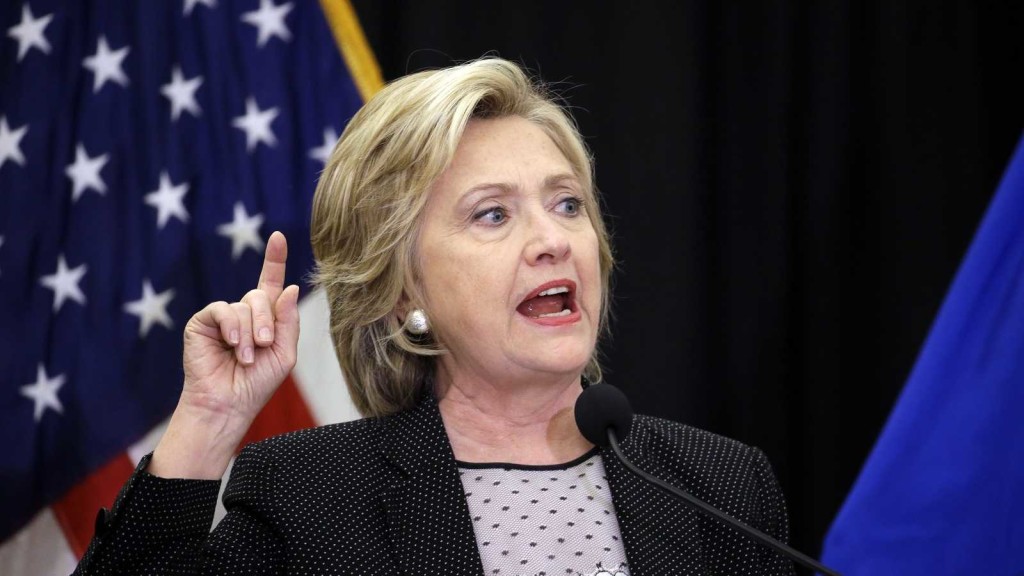
Hillary Clinton‘s campaign is pushing back against congressional Republicans who have challenged the FBI’s decision not to pursue criminal charges against the Democratic presidential nominee and have pressed for yet another investigation. Having failed to find evidence to support their claims that Clinton was negligent in preventing or stopping the deadly 2012 terrorist attack on the U.S. diplomatic facility in Benghazi, Libya, Republicans are now focused on whether Clinton shaded the truth about her haphazard handling of emails containing government secrets. Furious the FBI didn’t press charges against their political rival, House GOP members asked the agency for notes from its agents’ July interview with Clinton. The FBI provided Congress on Tuesday with a raft of documents from its yearlong investigation that it wrapped up last month. Republicans claim the FBI notes, which are typically kept confidential, may show Clinton provided inconsistent answers to questions about her handling of emails containing classified information during testimony last year before the House Benghazi panel. Democrats, meanwhile, expressed concern that the Republicans would leak snippets of the classified materials carefully selected to make the presidential candidate look bad without providing a fair account of what happened. Clinton spokesman Brian Fallon said Tuesday the campaign would like the FBI notes to be publicly released in full. “This is an extraordinarily rare step that was sought solely by Republicans for the purposes of further second-guessing the career professionals at the FBI,” Fallon said. “We believe that if these materials are going to be shared outside the Justice Department, they should be released widely so that the public can see them for themselves, rather than allow Republicans to mischaracterize them through selective, partisan leaks.” A spokeswoman for the Republican-led House Oversight and Government Reform Committee said that the panel’s staff is reviewing documents that are classified as secret. Rep. Adam Schiff of California, the top Democrat on the House Intelligence Committee, said in a statement that the panel received “FBI witness interview reports, including that of Secretary Clinton’s interview, along with other materials from the FBI’s now closed investigative file.” The FBI, in a statement, made clear that it expected lawmakers to use the documents for oversight and not to selectively leak details three months before the election. “The material contains classified and other sensitive information and is being provided with the expectation it will not be disseminated or disclosed without FBI concurrence,” the agency said. The FBI last month closed its yearlong probe into whether Clinton and her aides mishandled sensitive information that flowed through a private email server located in the basement of her New York home. Though he described Clinton’s actions as “extremely careless,” FBI Director James Comey said his agents found no evidence of criminal wrongdoing. Clinton said last year that she turned over all 55,000 pages of work-related emails from her server, but said she deleted thousands more she and her lawyers deemed as personal. Clinton also says she never sent any information by email that was marked as classified. More than 100 emails exchanged by Clinton were subsequently reviewed and determined to contain information considered classified. As evidence Clinton lied, Republicans point to three email chains forwarded to Clinton that contained paragraphs marked “(C),” signifying they contained classified information. Rep. Elijah E. Cummings, the ranking Democrat on the House oversight committee, said Clinton did not originate the three email chains in question, which were forwarded to her private account by aides. He said only one of those emails was later determined by the State Department to contain classified information. “The FBI already determined unanimously that there is insufficient evidence of criminal wrongdoing,” said Cummings, D-Md. “Republicans are now investigating the investigator in a desperate attempt to resuscitate this issue, keep it in the headlines, and distract from Donald Trump’s sagging poll numbers.” State Department spokesman Mark Toner said Tuesday that the FBI allowed the department to review emails the agency is providing Congress. “I think we’re satisfied after having reviewed these emails that the FBI has made arrangements that the documents will be transmitted subject to appropriate handling controls,” he said, adding that the department respects the FBI’s desire to accommodate the requests of its congressional oversight committees. Toner said, however, that the department is still discussing with the FBI the release of additional notes from the interviews investigators did with Clinton and her aides. The announcement comes as the conservative group Judicial Watch announced that it would receive copies of thousands of previously undisclosed work-related emails sent or received by Clinton. The emails, recovered as part of the FBI’s probe, were recently returned to the State Department. Republished with permission of the Associated Press.
Martha Roby: Benghazi report shows ‘American government failed its people and lied to the public’
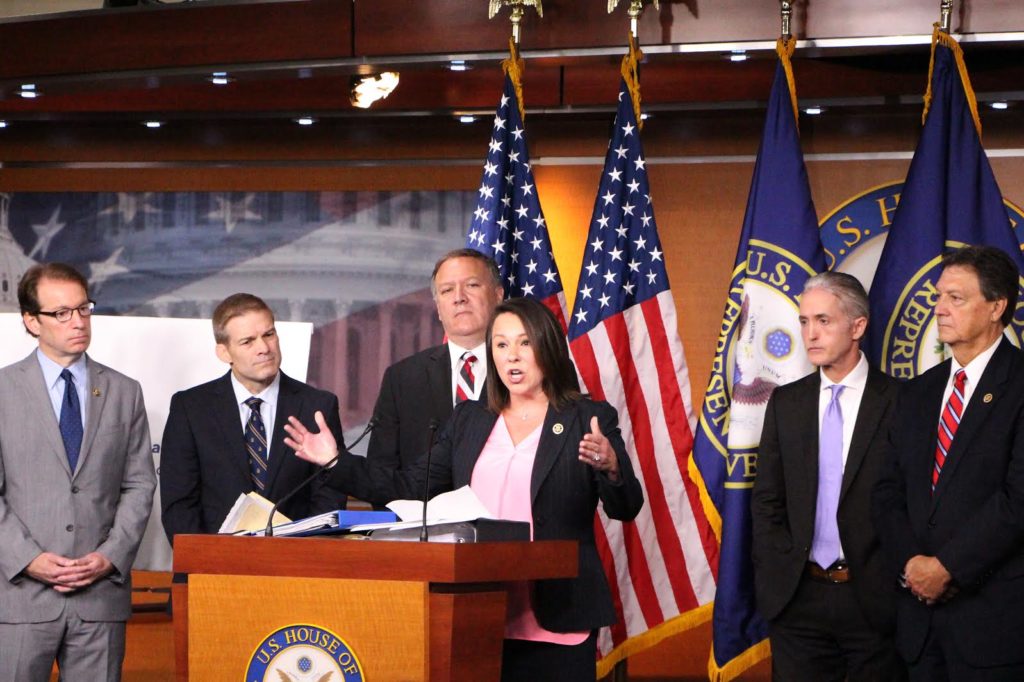
The Select Committee on Benghazi released its much-anticipated report Tuesday, documenting through more than 800 pages a better understanding of what happened leading up to, during and after the terrorist attacks that killed four Americans, including the U.S. Ambassador in Libya. New information released in the report reveals a clearer picture about the government’s mishandling of the attacks, including a failure to accommodate increased security requests, a lack of urgency to respond to the attacks and a coordinated effort to mislead the American public about the nature of the attacks. According to Alabama 2nd District U.S. Rep. Martha Roby, a member of the Select Committee, the United States government “failed its people and lied to the public.” “While our guys were on the ground taking gunfire and mortar attacks, Washington was moving at a snail’s pace,” Roby said at news conference Tuesday announcing the report. “In Washington, the Administration was more concerned about diplomatic sensitivities with the Libyans and promoting its policy agenda as successful than it was about the safety of the Americans it sent there.” Roby went on to explain the committee’s investigative efforts were met with strong opposition from the Defense Department, “and now we know why.” Pointing out the DOD failed to deploy to Benghazi in an effort to save Americans at the overrun compound. “At the end of the day, no military assets directed by Washington ever moved toward Benghazi,” Roby said. “The bottom line is that Washington failed to have our guys’ back when they needed it. From my perspective, this lack of urgency demonstrates either incompetence or indifference, or both.” “In this case, the American government failed its people and lied to the public in the aftermath,” Roby concluded. “This is unacceptable, and I know that our report shines a bright light on these events so we can prevent this from ever happening again.” Watch Roby at the news conference below:
Hillary Clinton responds to Benghazi report: ‘It’s time to move on’
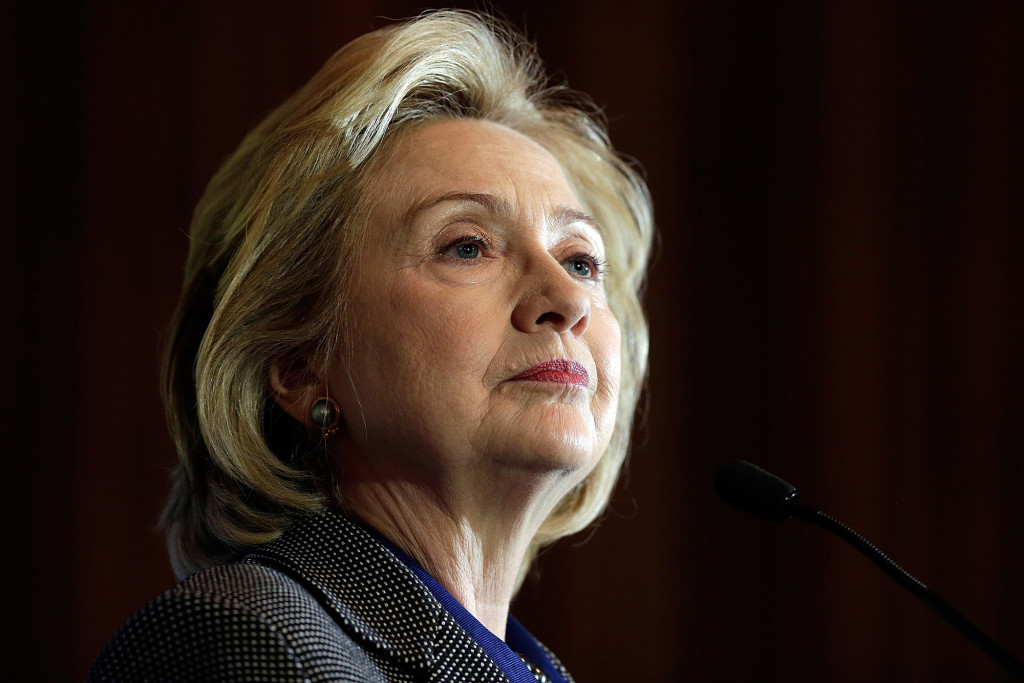
Presumed Democratic nominee Hillary Clinton responded Tuesday to the closure of the the House Benghazi Committee investigation, saying she would “leave it to others to characterize this report but I think it is pretty clear it is time to move on.” “I have said from the very beginning nothing is more important than the security of our diplomats and our development officials to go into dangerous places around the world pursuing American values, interests and our security,” Clinton said at an event in Denver, CO. “And I said this when I testified for 11 hours that no one has thought more about or lost more sleep over the lives that we lost, the four Americans, which was devastating. And we owe to those brave Americans that we make sure we learn the right lessons from this tragedy.” Clinton also claimed the investigation had taken on a “partisan tinge,” noting that the committee spent $7 million on the investigation. “That’s why I immediately put together an independent committee to go everywhere, look everywhere, come up with what recommendations would help us prevent such tragedies in the future, and that of course should be the goal,” she continued. “I understand that after two years and more than $7 million spent by the Benghazi Committee out of taxpayer funds, it had to today report it had found nothing – nothing to contradict the conclusions of the Independent Accountability Board or the conclusions of the prior multiple earlier investigations carried out on a bipartisan basis in the Congress. So while this unfortunately took on a partisan tinge, I want us to stay focused on what I’ve always wanted us to stay focused on and that is the important work of diplomacy and development.” House Republicans on the committee found that Barack Obama Administration was at fault for a lack of security and a slow response for the deadly 2012 terror attacks at the U.S. diplomatic outpost in Libya. “And the best way to honor the commitment and sacrifice of those we lost is to redouble our efforts to provide the resources and support that our diplomats and our development experts deserve,” Clinton concluded.
Martin Dyckman: With ‘colossal liar’ Donald Trump, nightmares could become reality
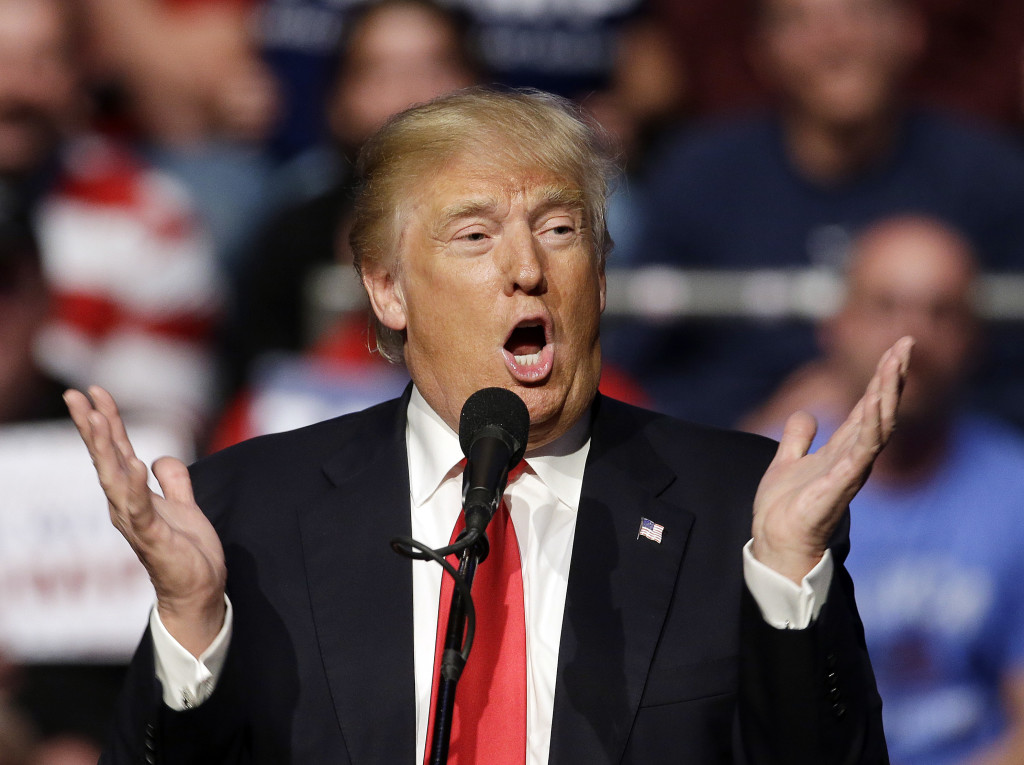
Donald Trump has audacious proposals to wall off Mexico and bar Muslim immigrants, but he hasn’t said how he would stop people from sneaking around the barriers or overstaying visas. How might he manage that? Let’s surmise one way. He could be planning to implant every lawful resident with an identification chip like those the veterinarian offers to your dog or cat. The process is relatively painless and doesn’t cost much. Newborns and legitimate visitors would be first. Others would have their turn in order to renew their drivers’ licenses, receive a tax refund, or show up to vote. Strategically placed surveillance devices would detect people without chips to be held for questioning. “We have no choice,” he would say. Stop. Roll back. This is fiction. I have absolutely no evidence that anything of the sort has occurred even to Trump. Identity chips have been the fantasy only of some folks on the far right who enjoy suspecting that their own government is out to get them. They’re probably huge Trump fans. They’re susceptible to believing anything bad about their country’s leadership, and that’s what he trades on. They’d better be careful, though. With Trump, one of their nightmares could become reality. As Trump himself would say, who knows? Stop. Roll back. I say again, this is fiction. But it’s no more false, fanciful or outrageous than the paranoid fables that Trump persistently passes off as casually as you or I might say, “How’s it going today?” After the slaughter at Orlando, Trump had the gall to imply that President Obama was somehow responsible. Proof? “There’s something going on,” Trump said. That’s not proof. He prepared for his campaign by flogging the birther nonsense even after all but a few certifiable lunatics had accepted the redundant evidence of Barack Obama’s native-born citizenship. He has been digging into his party’s dry-as-dust Benghazi well by charging that Hillary Clinton was asleep rather than answering the phone when the American consulate was under attack. That’s a takeoff on her campaign question, “Who do you want in the White House when the phone rings at 3 a.m.?” The trouble with Trump’s attempt to exploit Benghazi in that regard is that while the assault took place at nighttime in Libya, it was full daylight in the United States. The secretary of state was not napping. After verifying that she was in her Washington office, PolitiFact rated Trump’s claim “false.” Pressed repeatedly on the insinuation, Trump finally admitted on NBC News that it might not be true. “It happened all during the day and was going on for a long period of time — it was going on for a long period of time and she was asleep at the wheel, whether she was sleeping or not, who knows if she was sleeping?” he said. Who knows? If such speculative claptrap is legitimate politicking, here are a few other possibilities: Is Trump insane? Who knows? Does he maintain a secret harem somewhere? Who knows? Does he have a fortune stashed in Russian banks, and is that why he’s refusing to divulge his income tax returns? Who knows? Trump continues to remind us that the Republican Party is about to nominate, for the most important office in the world, someone who doesn’t care even in the slightest whether there’s any truth to what he says. He is a deliberate liar who’s as eager to deceive everyone in the same way he took advantage of people expecting to learn something useful from the so-called Trump University. The lesson that most learned was to not be swindled again. And when Trump accuses Clinton of being the most corrupt presidential candidate ever, she must know what it’s like to be called ugly by a frog. Trump should look in the mirror. He is as corrupt, if not more so, than any individual who has ever run for any office in the United States. To tell lies and willfully repeat them after they have been exposed is a profound form of corruption. To lure hard-working Americans into seminars on the premise that they will learn to be rich and then stiff them for ever-costlier upgrades they can’t afford is a profound form of corruption. To habitually take corporations into bankruptcy, enriching oneself while leaving creditors and investors with little or nothing, is corruption. Giving him the benefit of the doubt, once can be the failure of good intentions. But at the old saying goes, “Fool me once, your fault. Fool me twice, my fault.” The presidency of the United States — the leadership of the free world — is not on the order of a gambling casino or a golf course. We don’t dare be fooled even once. Especially not by so colossal a liar as Donald Trump. ___ Martin Dyckman is a retired associate editor of the newspaper now known as the Tampa Bay Times. He lives in suburban Asheville, North Carolina.
Veteran Clinton aide Cheryl Mills cites email server talks in testimony
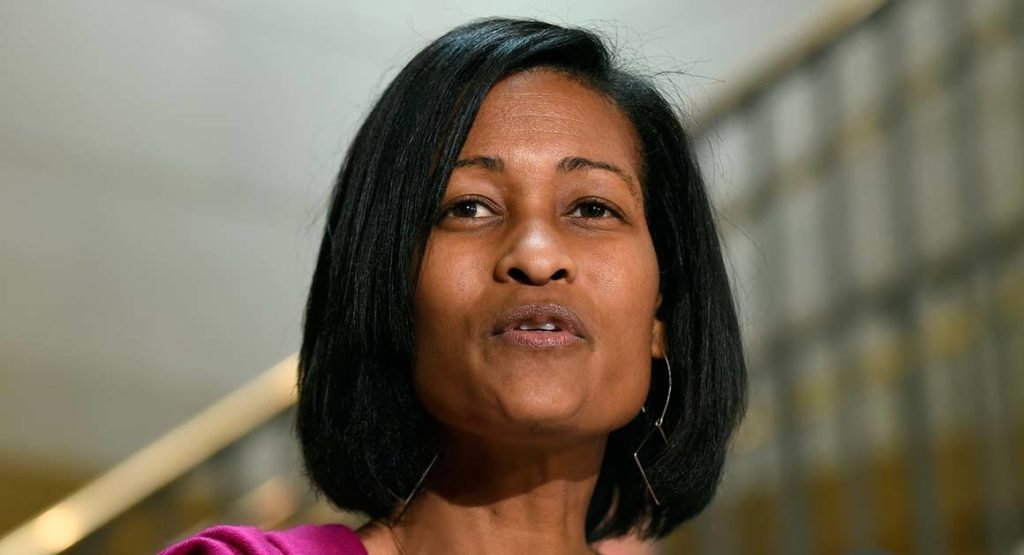
A veteran aide to Democratic presidential candidate Hillary Clinton said she discussed Clinton’s private email server with a technical aide who helped set up and run the system, according to a court deposition released Tuesday by a conservative legal group. Longtime Clinton aide Cheryl Mills acknowledged in five hours of testimony last week that her conversations with the technical aide, Bryan Pagliano, took place after Clinton stepped down as secretary of state in 2013. Mills, who was Clinton’s chief of staff at the State Department and later her private attorney, told lawyers for the legal group Judicial Watch that she spoke to Pagliano several times about the setup of Clinton’s email system. But Mills’ lawyers declined to allow Mills to speak in detail about Pagliano’s work or whether he was working at the time for either Clinton or her husband, former President Bill Clinton. Judicial Watch has sued the State Department for access to public records about Clinton’s use of private emails in her public job. Pagliano has reportedly cooperated with the FBI in its separate probe of Clinton’s emails but last year refused to testify to a congressional committee about his work on the email server, which was installed in the basement of the Clinton’s home in Chappaqua, N.Y. Clinton has said publicly that she is willing to talk with the FBI in its investigation, but said Tuesday in an interview with MSNBC that the agency has not yet scheduled a session with her. Judicial Watch President Tom Fitton said Tuesday that the extended session with Mills and her attorneys provided more information “about her email system, about its impact on FOIA (public records searches) and the fact that Ms. Mills was talking with Mr. Pagliano about this system after she left the State Department.” Much of the session, however, devolved into legal objections and sparring between lawyers for Mills and the legal group over how much she could relate without veering away from careful legal limits imposed by both sides. Mills did say she recalled speaking with Pagliano, who worked both as a private technical consultant to Clinton and as a special State Department aide during Clinton’s tenure, as far back as 2008 – a period when Pagliano was still working as an aide for Clinton’s unsuccessful 2008 presidential try. Mills did not characterize the discussions and said she could not recall in detail any discussions at the time about the set-up of Clinton’s email server. Mills also said she had expected that all the emails that she received from and sent to Clinton’s private email addresses would have been preserved and archived by State officials because her messages originated from the State Department’s email system. “It was my impression that when she emailed, because it was her practice to email people on their State accounts when she was doing State business, that any of those communications would be captured and maintained by the State Department system,” Mills said. On Tuesday Clinton said she never instructed any of her aides to “hide the fact that I was using a personal email … it was obvious to many people,” she told MSNBC. A report from the State Department inspector general last week said that on at least one occasion, a State Department supervisor warned two other agency officials not to raise questions about Clinton’s use of private emails. Republished with permission of The Associated Press
In NH speech, Marco Rubio once again calls Hillary Clinton a liar over Benghazi
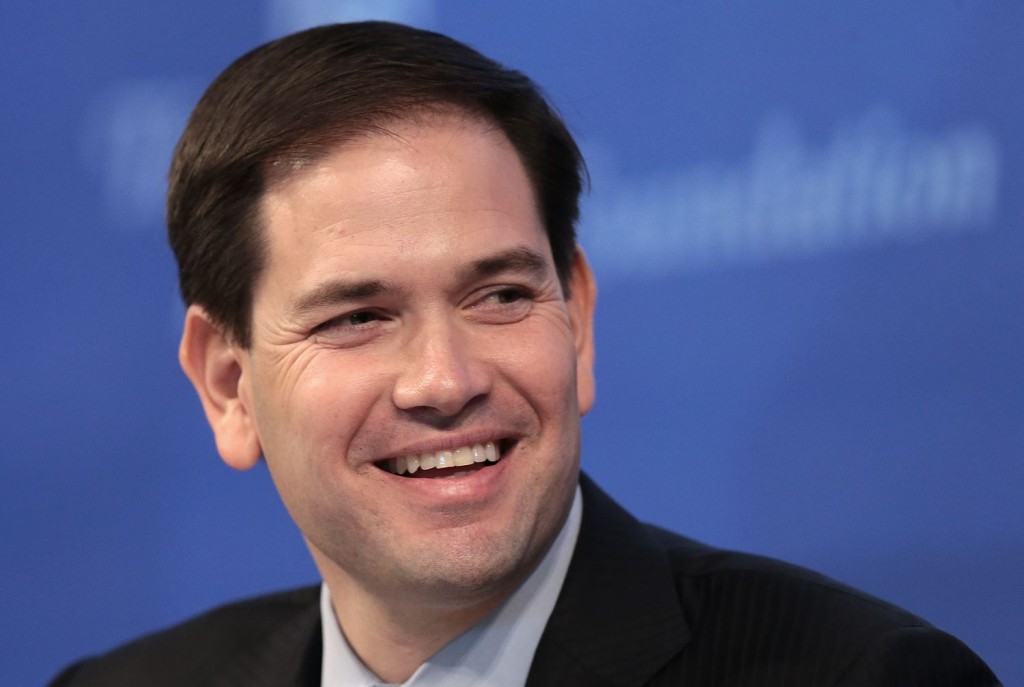
Marco Rubio blasted Hillary Clinton in a speech in New Hampshire early Monday, going as far as calling for the former secretary of state not only incompetent, but a liar. “While she was leading the public and the families of the fallen to believe the attack in Benghazi happened because of a YouTube video, we now know she was admitting in private emails that it was the result of terrorism,” Rubio said while addressing an American Legion audience in Hooksett, New Hampshire. “She lied to our faces. No one in the mainstream media has the courage to call her out for it. If I am our nominee, voters will be reminded of it time and time again.” It’s not the first time the Florida senator and GOP presidential candidate has gone as far as to bash Clinton with the “liar” label referring to her private comments on what happened at Benghazi vs. her public statements at the time. He did so back at a debate the CNBC hosted event in Colorado back in October, referring to her then recent appearance at a Benghazi Committee hearing. “She spent over a week telling the families of those victims and the American people that it was because of a video. And yet the mainstream media is going around saying it was the greatest week in Hillary Clinton’s campaign,” Rubio said at that debate. “It was the week she got exposed as a liar. It was the week that she got exposed as a liar.” Rubio spent the bulk of his speech on Monday in blasting Barack Obama. He began by referring to the fact that it was exactly eight years ago today that the world first learned of the then little-known Illinois senator, as it was the day after he stunningly had won the Iowa caucuses the night before. “There have always been voices in our country who say America’s not that different, that every country thinks they’re special – voices who question our role abroad, who think of America as a bully rather than as a leader. But in 2008, for the first time ever, one of these voices was elected president,” Rubio said. “A man was elected who condemned America for having “arrogance” and the audacity to “dictate our terms” to other nations. A man who apologized for America and bowed pitifully to foreign leaders. A man willing to abandon our allies, make concessions to our enemies, and worst of all, to make historic, devastating cuts to our military and intelligence capabilities. For a while, many thought all of this was the result of naivety. But it wasn’t. It’s now abundantly clear: Barack Obama has deliberately weakened America. He has made an intentional effort to humble us back to size. As if to say: We no longer need to be so powerful because our power has done more harm than good. “ Rubio went on to say that he is the only candidate in the race with a “detailed strategy” to roll back what he says is Obama’s failures. When you vote for me, you know exactly what you’ll get. You’ll get a president who will destroy terrorists overseas by authorizing whatever tools our commanders need. You’ll get a reversal of the defense cuts that Obama and Harry Reid have forced on our military. You’ll get a leader who upholds the promise we make to our men and women in uniform that we will never send them into a fair fight, but will always equip them with the upper hand. Anyone who supports Obama’s disastrous defense cuts cannot make that promise.” Following his speech to the American Legion, Rubio is scheduled to fly to Iowa later on Monday for an afternoon town hall in Burlington.
From Homeland to hair: Hillary Clinton emails peek into the personal

The latest release of Hillary Clinton‘s private emails show her, as secretary of state, dealing with the complicated politics of the Arab Spring, fending off questions about her role in the deadly 2012 Benghazi attacks and attempting to navigate an intensifying conflict between Israel and the Palestinians. But they also give a glimpse into the private side of one of the world’s most public people. Clinton’s notes show her searching for videos on how to do a “fishtail bun” hairstyle and struggling to locate Showtime on her television. (She wanted to watch the CIA-centered drama “Homeland.”) She schedules – and reschedules – flights, meals and hairstyling appointments. And as she flies around the globe – logging 956,733 miles over her tenure – she tries to keep track of the time zone. The roughly 7,800 pages of emails released Monday were part of a court-ordered disclosure of correspondence sent from the private server Clinton used while she was secretary of state. Clinton, now the front-runner for the 2016 Democratic presidential nomination, has faced questions about whether her unusual email setup was sufficient to ensure the security of government information and retention of records. Included in the most recent batch was an email that Intelligence Community Inspector General I. Charles McCullough III and State Department Inspector General Steve Linick deemed classified in July. At least two Senate committees are still investigating Clinton’s email arrangement and seeking the release of correspondence from her top aides. The FBI is also investigating the security of Clinton’s private email setup. Two-thirds of Clinton’s 30,000 work-related emails are now at least partially in the public eye – minus numerous redactions by the State Department. Here’s a closer look at some of the messages that churned through Clinton’s very busy in-box in the batch released Monday: — HEALTH POLITICS Get-well-soon notes poured in from across the globe after a stomach virus that Clinton picked up in 2012 became a serious condition that kept her out of the office – and off the congressional witness stand. After a dehydrated Clinton fainted and sustained a concussion – a condition she frequently called her “cracked head” in messages – she was forced to postpone her testimony before the House Foreign Affairs Committee about the deadly Benghazi attacks. Hollywood mogul Harvey Weinstein emailed her aide, Capricia Marshall, offering to send Clinton copies of any movies she wanted to watch while recuperating. Dorothea Hurley, the wife of rock star Jon Bon Jovi, checked in with Clinton’s daughter, Chelsea, to say that they were “sending you all a big hug.” Chelsea forwarded the message to her mother. Her health quickly became a political issue, with Republicans questioning her fitness should she ever run for president. Her staff moved quickly to tamp down the speculation. Top aide Philippe Reines told Clinton he’d reached out to former Tennessee Sen. Bill Frist, a heart transplant surgeon, and the NFL commissioner to enlist their support pushing back on right-wing commentators. “Just not letting these comments stand, no matter who says them,” Reines said. Frist was happy to help, according to the documents. “I love her and respect her and I can help. Not sure how exactly but I know I can help. I will Keep all Confidential,” he wrote. — 2012 ELECTIONS Although Clinton wasn’t on the ticket in 2012, she and her supporters followed the race closely – and had plenty to say. In a January 2012 note, during the heat of the Florida GOP primary, Clinton refers to Mitt Romney as “Mittens” and Newt Gingrich as “Grinch.” “If Mittens can’t beat Grinch in Florida, there will be pressure on state Republican parties to reopen or liberalize ballot access,” she writes to confidant Sid Blumenthal. — BENGHAZI At least a few of the messages have come back to haunt Clinton during her presidential bid. Shortly before 9 p.m. on Sept. 11, 2012, Clinton sent an email asking her daughter to call her at her office about the attack on the U.S. consulate in Benghazi, Libya. The email was addressed to an account under the name “Diane Reynolds,” an alias Chelsea Clinton used for personal messages. “Two of our officers were killed in Benghazi by an al-Qaida-like group: The Ambassador, whom I handpicked, and a young communications officer on temporary duty w(ith) a wife and two young children,” Hillary Clinton later wrote to her daughter. “Very hard day and I fear more of the same tomorrow.” In October, that email was trumpeted by Republicans on the House Benghazi committee as evidence that Clinton knew very quickly the attack on the consulate was the work of Islamic terrorists, not a spontaneous street protest triggered by the release of a video considered an insult to the Prophet Mohammed. In a later television interview, then-United Nations Ambassador Susan Rice suggested the video, which did spark anti-American protests that day in several Muslim countries, was the primary motivation for the attack. Republicans have suggested the Obama administration downplayed the terror threat to avoid stoking public safety concerns in the weeks leading up to the 2012 presidential election. Some of the messages show that Clinton worried about how her own remarks after the attacks would later be perceived. In a September 2012 message, aide Jake Sullivan compiled all her statements and assured Clinton that she was “careful” and “never said ‘spontaneous’ or characterized the motives.” “The way you treated the video in the Libya context was to say that some sought to (asterisk)justify(asterisk) the attack on that basis,” he wrote. — KEEPING THE TEAM TOGETHER Clinton maintained her ties with the Democratic Party donors who supported her past campaigns and could help her in the future. In November 2012, Samuel Kaplan, a Minneapolis lawyer and major Democratic donor who was appointed U.S. ambassador to Morocco, secured a private meeting with Clinton to discuss how he and his wife “might hope to be allied” with her in the future. Former Clinton aide Lauren Jiloty wrote to Clinton in 2012 to say she had
Bernie Sanders has most to prove as Democrats gather for 2nd debate

Vermont Sen. Bernie Sanders faces the biggest test yet of his insurgent presidential campaign on Saturday night, when he faces off with Democratic front-runner Hillary Rodham Clinton in the party’s second primary debate. His goal is clear: Reset a contest that increasingly looks like little more than a march to the nomination for Clinton. That effort will be complicated by fresh terrorist strikes that have captured the world’s attention. Despite Sanders’ focus on domestic issues, national security and foreign policy will play prominent roles in the debate, with the string of deadly attacks in Paris that killed more than 120 people front and center. All the candidates quickly denounced the attacks in statements on Friday night. Party officials said the forum will continue as planned. Foreign relations is an area where Clinton, a former secretary of state, is in the strongest position to talk about the attacks and the U.S. effort to dismantle the Islamic State group. But her tenure is tied to that of Obama, who’s struggled to contain the threat from Islamic militants in Syria and associated terror attacks across the globe. Clinton’s husband, former President Bill Clinton, accompanied her to Des Moines on Saturday but will not be in the hall for the debate, spokesman Angel Urena said. A spate of good news for Clinton since the party’s first debate a month ago has helped her rebuild a lead in the early voting states, an uptick that comes amid other signs the party is coalescing behind her. An Associated Press survey of superdelegates published Friday found that half of the Democratic insiders are publicly backing Clinton. Sanders may have inadvertently facilitated some of her progress in the first debate, when he seemed to dismiss the controversy over her use of a private email account and server by saying Americans are tired of hearing about her “damn emails.” Since then, he’s given her no more passes. Though careful never to mention Clinton by name, Sanders has drawn a series of contrasts with the former secretary of state on issues that include her backing of the war in Iraq, trade and the minimum wage. Sanders’ advisers say he plans to discuss the email issue only if the moderators of the debate in Des Moines, Iowa, bring it up. That could be a signal to organizers that he’s is open to the topic. “He’s definitely going to cut a harder contrast on core issues,” said Larry Cohen, a senior adviser to Sanders. “But it’s not going to be over personal style.” The problem for Sanders is that Clinton agrees with him on some of the core domestic issues of his campaign, having shifted to the left in recent weeks to oppose construction of the Keystone XL pipeline and the Trans-Pacific Partnership trade deal. “It’s really tough for him,” said Gina Glantz, manager of Bill Bradley‘s 2000 presidential campaign, which posed a primary challenge to then-Vice President Al Gore. “He’s in a difficult position where his current arguments aren’t enough to get beyond his core voter.” While Sanders aides bragged about their candidate’s lax preparation for the last debate, they shuttled him to his campaign headquarters in Burlington, Vermont, for mock sessions before this match-up. Clinton, too, has kept her schedule relatively clear over the last several days, leaving plenty of time for rehearsals. “They are absolutely prepared for the fact that Bernie’s going to come out swinging,” said Maria Cardona, a Democratic strategist who worked for Clinton’s failed 2008 White House campaign. “The question is how it’s going to happen.” Clinton supporters say their candidate will remain focused on laying out her vision for the future rather than striking back at Sanders. Her campaign has about $15.2 million in television advertising planned through mid-February, compared with a $3.2 million Sanders ad buy that ends next week, according to Kantar Media’s CMAG advertising tracker. The Service Employees International Union, an influential force in Democratic politics, is expected to issue their endorsement on Tuesday, according to people knowledgeable about the union’s process. Clinton has been backed by more than 72 percent of members in all their internal polling, including the most recent survey conducted a few weeks ago. Her team is hoping to notch another win after a series of strong moments since the first debate. Clinton has benefited from Vice President Joe Biden‘s decision to forgo a run and well-received testimony before a Republican-led congressional panel investigating the deadly 2012 attacks in Benghazi, Libya. They’re also trying not to alienate the Sanders backers whose support they’ll need should Clinton win the nomination. “As a front-runner your job is to do no harm,” said Cardona. “She’s going to want to be a comfortable home for the Bernie supporters toward the end of this process.” Sanders, too, may face tougher attacks. Former Maryland Gov. Martin O’Malley, who’s struggled to break 5 percent in national preference polls, has questioned Sanders’ commitment to the Democratic Party and President Barack Obama, still a popular figure among Democrats. A more aggressive tone would mark a shift for a race that has so far been notable for its civility. Democrats have spent months boasting about the substantive tone of their contest, attempting to set-up a favorable early contrast with the often carnival-like insults of the crowded Republican primary. Their bragging may come to an end after Saturday night. Republished with permission of the Associated Press.


